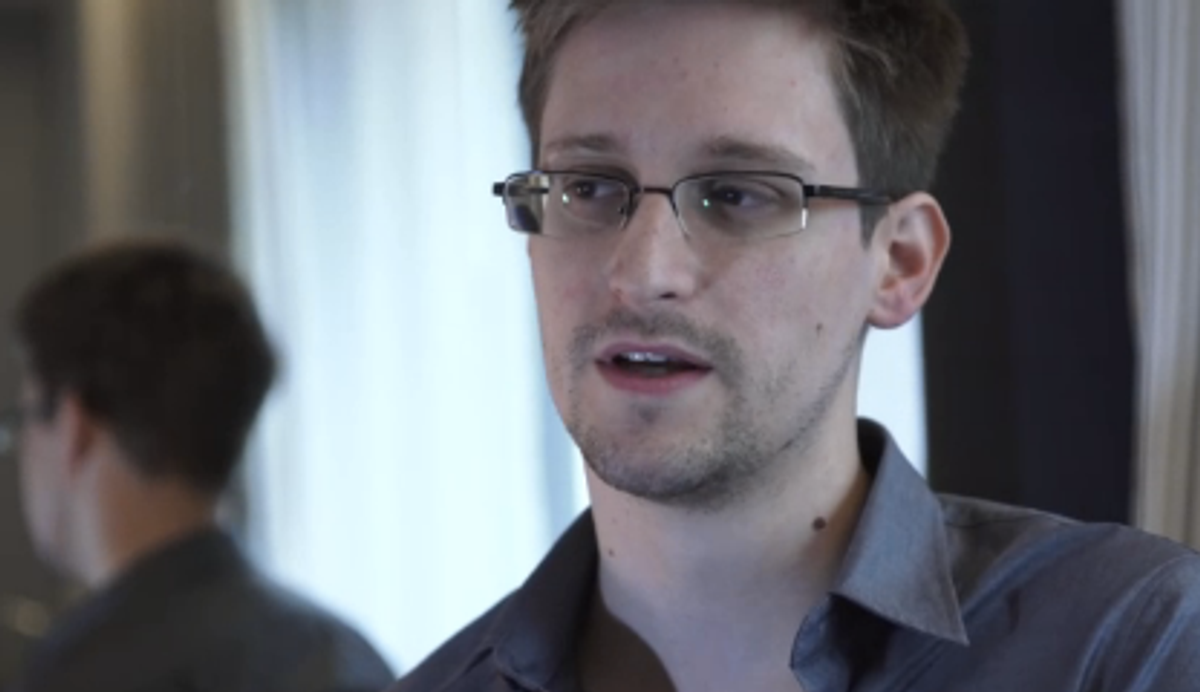Following multiple stunning intelligence leaks revealing the scope and scale of our government's data-gathering and analyzing abilities, an important, long-overdue debate has raged in papers, on the Internet, and on TV: Is Edward Snowden a big jerk or the best dude ever?
There is the (interesting but only marginally consequential) media debate over the terminology to use when referring to Snowden: Leaker, whistle-blower, source? And then there is the much sillier public wrangling over whether Snowden is a "hero" or a "traitor," as if those maddeningly reductive (and not exclusive) terms expressed anything other than the speakers' tribal allegiances and predispositions. He's a man who did a remarkable and newsworthy thing. The thing he did is what people should probably still be talking about.
The New Yorker on Sunday and Monday ran three different pieces, by three different authors, examining Snowden the man. The first, and best, was by Amy Davidson, who sketched his biography and quoted his justifications, but largely held off on casting moral judgment in favor of raising useful questions: "How many people with a private contractors’ job and a password have the privilege of knowing the names of our spies?" And:
What are government’s proper privileges? How we respond to the vast assembly of information on Edward Snowden’s computer, or Bradley Manning’s for that matter, is a test. Do we think that the answer is to collect and collect, classify and classify, and then hunt wildly and angrily when a guy in his twenties walks away with more than he should? Or are we ready to talk about our secrets?
Following that, the magazine hosted a rather unilluminating argument between John Cassidy (POINT: Snowden is a hero) and Jeffrey Toobin (COUNTERPOINT: No he isn't.). Toobin says Snowden is naive, narcissistic and guilty of a crime. Cassidy says Snowden "has performed a great public service." Maybe they're both right! Maybe whether or not he's flaky or sufficiently patriotic has no bearing on the information he made public.
Snowden's biography is certainly interesting. The story of how and why he leaked is gripping stuff. Insomuch as his story raises questions about the privatization of surveillance it's quite important. It's bizarre that there are Booz Hamilton contractors without college degrees living in Hawaii pulling down six-figure salaries with top secret clearance. But people are arguing about his heroism or treasonousness because it's a simple, dumb argument to have.
The debate became whether or not Snowden is a hero because that is easier to talk about. Pick a side! Argue! The same thing happened before Snowden was revealed as the leaker, as hundreds of people felt it necessary to announce that they had Important Opinions about the work of Glenn Greenwald. (Once the Post got in on the fun, the ad hominem Greenwald attacks suddenly seemed even less relevant.) Some people hated Greenwald, for various reasons, and that was easier to talk about than the substance of the stories he was reporting.
If you're a straight-up dolt like Richard Cohen, you probably don't understand the complicated tech stuff involved in the NSA's data-mining, so you just call Snowden "a cross-dressing Little Red Riding Hood" and endorse your check. (Meanwhile your actually informed colleagues file informative reports like this one co-authored by Dana Priest.)
If you're Politico, where the meta-story is always more relevant than the story-story, you write a few hundred words about how the White House is grateful that everyone is arguing about Snowden instead of about surveillance. You quote Paul Begala asking if James Franco will play him in the movie. That's fun! Plus you don't need to think seriously about difficult questions to get and print that quote. Politico, as an institution, is incapable of criticizing or seriously analyzing the national security state (some of their best advertisers are defense contractors!), so it is quite fortuitous for them that they can treat this story as another issue of personalities and ineffable "scandal."
The debate we're supposed to be having now is over whether our vast surveillance capabilities are constitutional, whether it operates with sufficient oversight, and why we entrust tens of thousands of private military contractors with access to potentially intimate details about anyone who uses a computer regularly. The story of Edward Snowden is fascinating, and if and when law enforcement catches up with him his intentions and methods will certainly be worth arguing over, but right now it's just an excuse to apply an idiotic cable news frame to the story.
But in the course of debating the national security state one might accidentally come to a rather radical opinion, and taking sides on that question is much more dangerous, for a centrist or "objective" establishmentarian, than taking sides on this guy.
The press still hasn't yet completely nailed down the actual facts of the story -- how and how much the NSA (and CIA and FBI) monitor us and the world -- because that's quite hard. But at the moment it's what I'm much more interested in reading. Another ill-informed pundit's "take" on whether Edward Snowden is a super-awesome hero or a dumb America-hating meanie? No, thanks.
Now we all found his girlfriend so I'm positive the discourse will just get better and better.

Shares